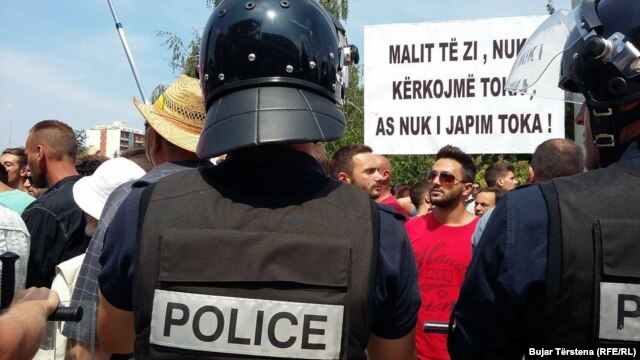Kosovo postpones Montenegro border vote amid protests, Serb boycott
| Publisher | Radio Free Europe/Radio Liberty |
| Publication Date | 1 September 2016 |
| Cite as | Radio Free Europe/Radio Liberty, Kosovo postpones Montenegro border vote amid protests, Serb boycott, 1 September 2016, available at: https://www.refworld.org/docid/57db9a7913.html [accessed 21 May 2023] |
| Comments | All reference to Kosovo should be understood in full compliance with United Nations Security Council Resolution 1244. |
| Disclaimer | This is not a UNHCR publication. UNHCR is not responsible for, nor does it necessarily endorse, its content. Any views expressed are solely those of the author or publisher and do not necessarily reflect those of UNHCR, the United Nations or its Member States. |
September 01, 2016
By RFE/RL's Balkan Service
 Demonstrations have been held repeatedly outside the parliament in Pristina by protesters who say a border agreement with Montenegro would give away a swath of Kosovo's territory.
Demonstrations have been held repeatedly outside the parliament in Pristina by protesters who say a border agreement with Montenegro would give away a swath of Kosovo's territory.
Amid fierce protests by nationalists and a boycott by Serbian deputies, Kosovo's government has called off a parliamentary vote on a controversial bill that would demarcate the country's border with Montenegro and move the country closer to European Union membership.
Kosovar Prime Minister Isa Mustafa said on September 1 that "political pressure" by the opposition led to the draft law being removed from the parliament's agenda. He said the legislation would be reconsidered at a later date.
Hundreds of people opposed to the demarcation bill broke into applause at news of the postponement and claimed victory.
Police detained deputy parliament speaker Aida Derguti outside of parliament on September 1 and said they found some spray cans among opposition deputies. They also said a raid earlier in the day uncovered material used to make Molotov cocktails.
Tear gas has been sprayed by opposition deputies in parliament several times in the past year in protest against the bill.
Fatmir Limaj, the chairman of the opposition Initiative for Kosovo party, said the vote on the bill was postponed due to the refusal of ethnic Serbian deputies to attend the parliament session.
The draft law needs two-thirds of the 120 votes in parliament, and opposition deputies and some belonging to ruling parties oppose the demarcation plan.
Ethnic Serbian deputies hold 11 seats in the parliament and their votes – as members of the ruling coalition – are seen as crucial to the bill's approval.
Slavko Simic, the head of the Serb List (Kosovo) party, told RFE/RL that lawmakers from his party did not attend the parliament session due to "the complex security environment for Kosovar Serbs and their property."
He added that other members of the ruling coalition had "obstructed every vital process consistent with the interests of the [ethnic] Serbian people in Kosovo."
'Good For Kosovo'
Passage of the border plan has been touted by the United States and EU member countries as necessary for the Balkan country to move closer to Brussels and secure visa-free travel to the EU.
U.S. Ambassador to Kosovo Greg Delawie told RFE/RL that the demarcation plan is "good for Kosovo and the region."
He warned that using the issue to score political points would lead to "xenophobia and nationalism."
The demarcation proposal – which was signed by Kosovar and Montenegrin officials in 2015 – has set off protests around the country led by opposition parties who say the bill would transfer some 8,200 hectares of land to Montenegro.
Government officials reject that charge and say the border as defined in the draft law follows the boundaries of Kosovo as laid out by UN Special Envoy to Kosovo Martti Ahtisaari in 2007 before recommending supervised independence for Kosovo, which had been a Serbian province.
Kosovo declared independence in 2008 and has been recognized by 112 countries.
Kosovo was placed under UN administration in 1999, shortly after the end of the Kosovo War in which several thousand people were killed and more than 1 million people were displaced.
Written by Pete Baumgartner based on reporting by Amra Zejneli and Arbana Vidishiqi of RFE/RL's Balkan Service
Link to original story on RFE/RL website
